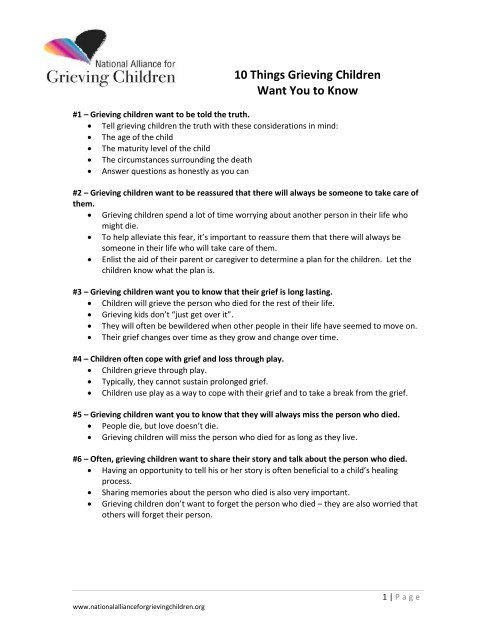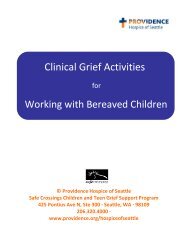10 Things Grieving Children Want You to Know
10 Things Grieving Children Want You to Know
10 Things Grieving Children Want You to Know
Create successful ePaper yourself
Turn your PDF publications into a flip-book with our unique Google optimized e-Paper software.
www.nationalallianceforgrievingchildren.org<br />
<strong>10</strong> <strong>Things</strong> <strong>Grieving</strong> <strong>Children</strong><br />
<strong>Want</strong> <strong>You</strong> <strong>to</strong> <strong>Know</strong><br />
#1 – <strong>Grieving</strong> children want <strong>to</strong> be <strong>to</strong>ld the truth.<br />
Tell grieving children the truth with these considerations in mind:<br />
The age of the child<br />
The maturity level of the child<br />
The circumstances surrounding the death<br />
Answer questions as honestly as you can<br />
#2 – <strong>Grieving</strong> children want <strong>to</strong> be reassured that there will always be someone <strong>to</strong> take care of<br />
them.<br />
<strong>Grieving</strong> children spend a lot of time worrying about another person in their life who<br />
might die.<br />
To help alleviate this fear, it’s important <strong>to</strong> reassure them that there will always be<br />
someone in their life who will take care of them.<br />
Enlist the aid of their parent or caregiver <strong>to</strong> determine a plan for the children. Let the<br />
children know what the plan is.<br />
#3 – <strong>Grieving</strong> children want you <strong>to</strong> know that their grief is long lasting.<br />
<strong>Children</strong> will grieve the person who died for the rest of their life.<br />
<strong>Grieving</strong> kids don’t “just get over it”.<br />
They will often be bewildered when other people in their life have seemed <strong>to</strong> move on.<br />
Their grief changes over time as they grow and change over time.<br />
#4 – <strong>Children</strong> often cope with grief and loss through play.<br />
<strong>Children</strong> grieve through play.<br />
Typically, they cannot sustain prolonged grief.<br />
<strong>Children</strong> use play as a way <strong>to</strong> cope with their grief and <strong>to</strong> take a break from the grief.<br />
#5 – <strong>Grieving</strong> children want you <strong>to</strong> know that they will always miss the person who died.<br />
People die, but love doesn’t die.<br />
<strong>Grieving</strong> children will miss the person who died for as long as they live.<br />
#6 – Often, grieving children want <strong>to</strong> share their s<strong>to</strong>ry and talk about the person who died.<br />
Having an opportunity <strong>to</strong> tell his or her s<strong>to</strong>ry is often beneficial <strong>to</strong> a child’s healing<br />
process.<br />
Sharing memories about the person who died is also very important.<br />
<strong>Grieving</strong> children don’t want <strong>to</strong> forget the person who died – they are also worried that<br />
others will forget their person.<br />
1 | P a g e
<strong>10</strong> <strong>Things</strong> <strong>Grieving</strong> <strong>Children</strong> <strong>Want</strong> <strong>You</strong> <strong>to</strong> <strong>Know</strong> (continued)<br />
#7 – Every child grieves differently.<br />
Every child has his or her own grief journey and own way of grieving.<br />
Some children might be more expressive with their grief.<br />
Some children might keep it all in.<br />
Siblings grieve differently.<br />
Just because children come from the same family doesn’t mean that their grief will be<br />
the same.<br />
It is important <strong>to</strong> honor each child’s s<strong>to</strong>ry, even if it is different than his or her sibling’s<br />
s<strong>to</strong>ry.<br />
#8 – <strong>Grieving</strong> children often feel guilty.<br />
<strong>Grieving</strong> children will often feel pangs of guilt.<br />
Even if the guilt is not justified and has no basis in reality.<br />
#9 – Even though I might be acting out, what I’m really feeling is intense emotions of grief.<br />
<strong>Grieving</strong> children frequently feel sad, angry, confused, or scared.<br />
Since they might not know how <strong>to</strong> express all of these emotions, they often end up<br />
acting out instead.<br />
#<strong>10</strong> - If you’re not sure what a grieving child wants, just ask him!<br />
When in doubt, ask a grieving child how you can help.<br />
Check in with the child – do they want <strong>to</strong> talk about the person who died? Maybe not.<br />
Expect myriad answers.<br />
Do they want <strong>to</strong> write about their grief or do some other activity <strong>to</strong> express their grief?<br />
What do they need?<br />
<strong>You</strong> can help grieving children by:<br />
Listening<br />
Really hearing them when you’re listening<br />
Following their lead<br />
Validating their feelings<br />
Answering their questions<br />
Seeking out additional resources, as needed<br />
Written by: Pamela Gabbay, M.A., FT<br />
Program Direc<strong>to</strong>r<br />
The Mourning Star Center for<br />
<strong>Grieving</strong> <strong>Children</strong> and Teens<br />
Camp Direc<strong>to</strong>r, Camp Erin<br />
(760) 836-0360<br />
www.mourningstar.org<br />
www.nationalallianceforgrievingchildren.org<br />
2 | P a g e



